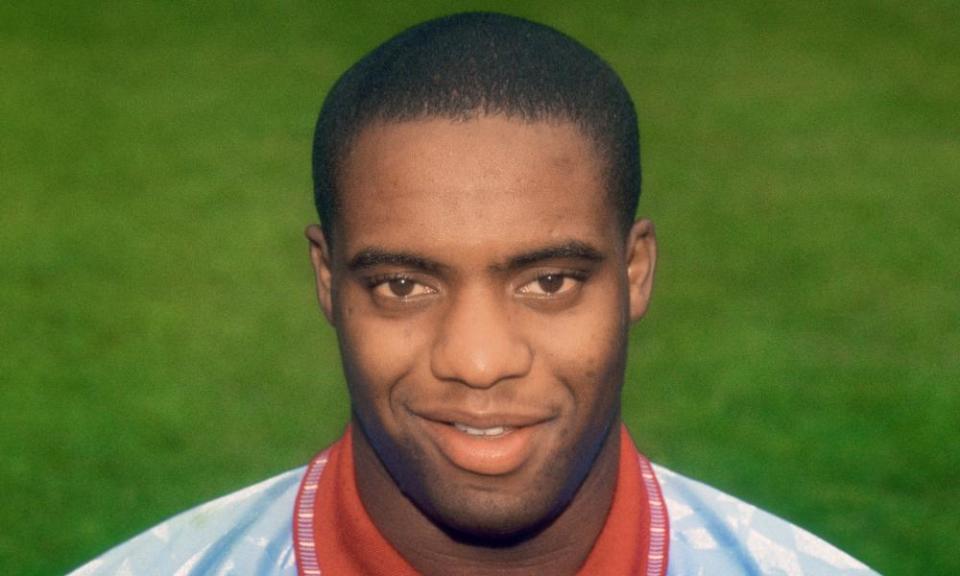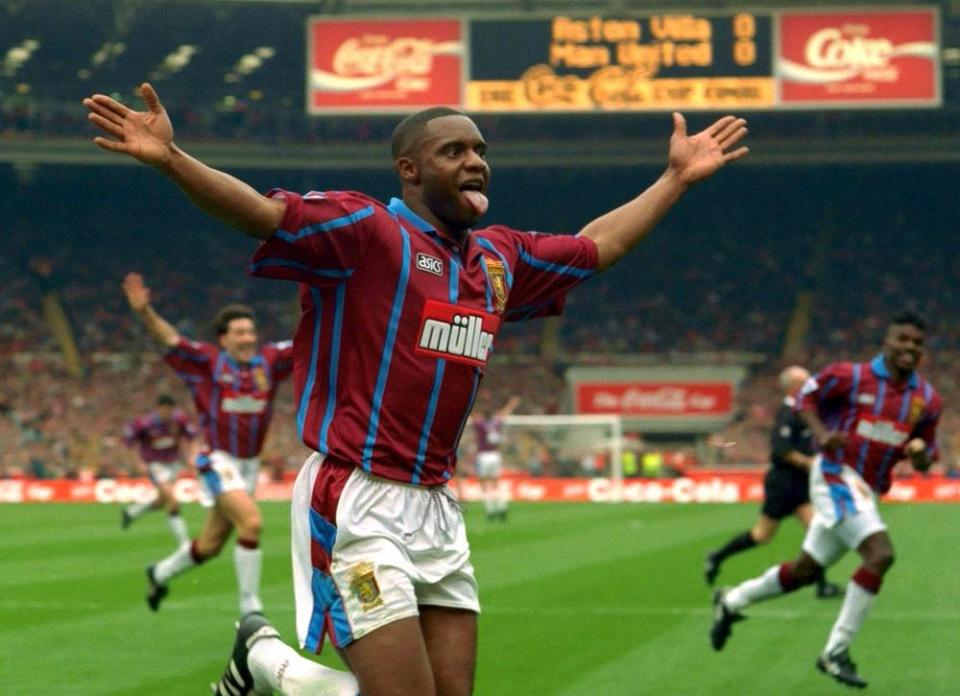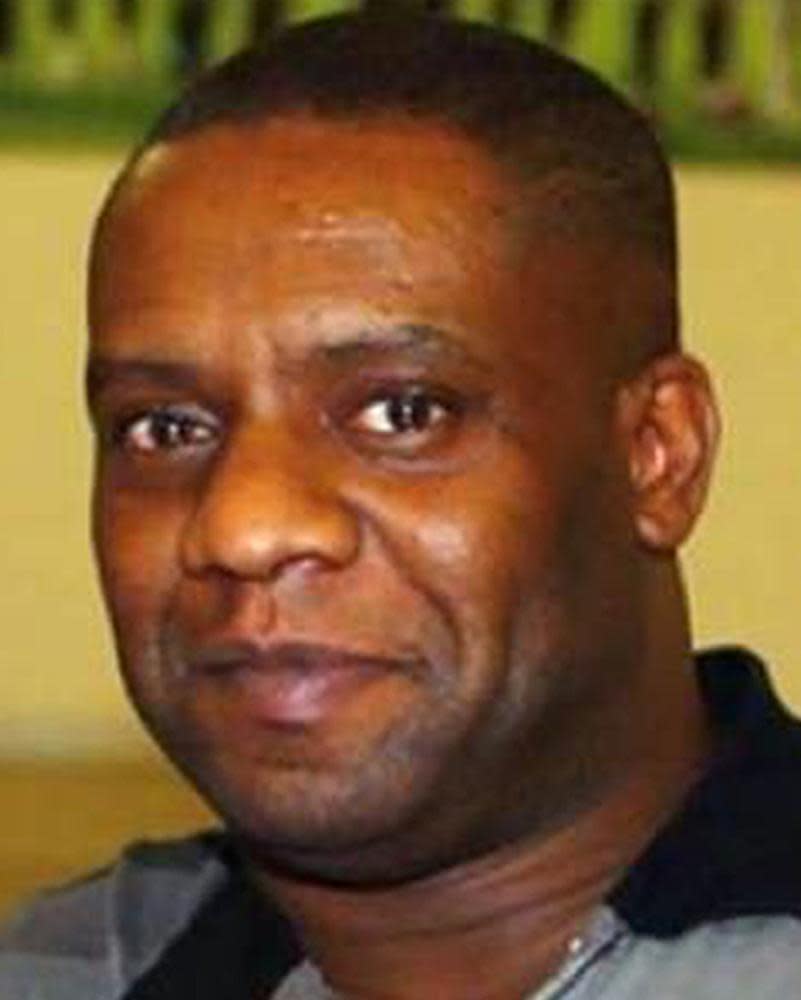‘On his day, he was unbelievable’: the outstanding career of Dalian Atkinson

Dalian Atkinson scored one of the best goals in Premier League history during a unique career in which he hinted at greatness, enraptured fans and embraced thrills.
He played for 10 clubs in seven countries, often making spectacular impacts, always making friends, yet he retired leaving a sense that his talent had not been realised.
Injuries hampered him throughout his career and illness afflicted him afterwards. Then his life was cut short at the age of 48, in a street where he had played as a child.
Born in March 1968 in Shrewsbury, Atkinson grew up in Telford, where Bob Ellis, a school teacher who did a bit of scouting, recommended him to Ipswich Town. He began training with the Suffolk club before being engaged as an apprentice and housed with a local couple.
“When you leave home at the age of 16 or so to get on the first rung of the professional ladder, you need to have a bit about you,” said Simon Milton, who joined Ipswich as an apprentice soon after Atkinson. “Dalian certainly had a bit about him. He was a larger than life character, very bouncy and infectious, always smiling, a really bubbly member of the squad. We became good friends. He could be cheeky, too, and the coaches were always on at him because he had so much potential. He was a real character and on his day, wow, he was one of the best players going.”
He made his senior Ipswich debut a week before his 18th birthday, coming on as a substitute at Newcastle after being racially abused while warming up, a routine torment for black players at the time. As he tried to establish himself he dipped in and out of the first team. And he attracted attention. “Football wasn’t the only thing in Dalian’s life, he also liked the trappings,” said Milton. He made no attempt to hide his fondness for women and fast cars but his talent was what made him really extraordinary.
The young forward really caught the eye when he scored three superb goals against the league leaders Middlesbrough – “it’s still the best hat-trick I’ve ever seen,” said Milton.
A year later Atkinson moved for £400,000 to Sheffield Wednesday, then managed by Ron Atkinson, who said he was as quick as any player he had coached.
The striker spent one season with Wednesday, performing so well that he attracted interest from Real Sociedad, a club in the Basque country in Spain. Atkinson stayed at la Real for only one season but left lasting memories.
“He had a huge impact,” his former teammate Luis Dadíe remembered. “It was absolutely marvellous watching him. He left us open-mouthed. Dalian was a modern player: direct, so fast, he could run with the ball, carry it, take people on. It was incredible. In our age, we hadn’t really seen players like that. These days, that would be pure gold.”
He also stood out for other reasons. He was regularly spotted around San Sebastián, zooming about in his red Ferrari or sampling the local nightlife. “The fans were wowed by him but they would also see him out in the small hours,” said another former teammate, Jonan Larrañaga. “In the end, his youth got the better of him.”
Atkinson was also the club’s first black player and one of very few black people in the city. He was nicknamed Txipirón, the squid, because of its ink. The player told the Spanish sports newspaper Marca he never felt “any discrimination, just affection”. In July 1991, Atkinson returned to England to play for Aston Villa, who paid a club record fee to bring him back to the Midlands.
During three and a half years at Villa, he reached his peak. Despite injuries and off days, he was among the most entertaining and effective players in the Premier League. His goal against Wimbledon in October 1992, when he picked the ball up midway inside his own half before leaving four opponents floundering in his wake and sending a delicate lob over the goalkeeper from more than 20 yards, was voted goal of the season and is still shown on Villa Park’s giant screen before every home match.

“As a player, on his day, he was unbelievable, virtually unplayable,” said the former Villa winger Tony Daley. “There were games, even training sessions, where he was too quick for the opposition, too strong, better in the air and hit unstoppable shots with his left and right feet. And then some days you wouldn’t get Dalian at all. He was a bit inconsistent. Football wasn’t the most important thing in his life. But I got on really well with him, he was such a likable soul and his company was gold.”
“When Dalian was on form, he was almost unstoppable,” said Shaun Teale, who joined Villa in the same summer as Atkinson. “He had pace and power and some of his finishing was unbelievable.
“People had reservations about him because sometimes he’d be injured and you could not understand how, or he’d say he couldn’t play because he had a cold; and sometimes he’d miss training and you’d never find out why. But he certainly had more good days than bad days and the fans always thought very highly of him.”
In the 1993-4 season, Villa won silverware when they beat Manchester United in the League Cup final. Atkinson was deployed on the wing rather than centrally and he opened the scoring in a 3-1 win at Wembley. “You could always rely on Dalian in the big games,” said Teale.

Villa changed managers the following November and the new hire, Brian Little, could not get the best out of Atkinson, who was often injured. In March 1995 the player decided to move abroad again, heading to Istanbul to join Fenerbahçe.
England had a wealth of high-calibre strikers in the early 90s, with the likes of Alan Shearer, Ian Wright, Andy Cole, Robbie Fowler and Les Ferdinand excelling consistently for their clubs. None of those had a reputation quite like Atkinson’s. “I think he would have got an England cap if it wasn’t for this thing that followed him around,” said Teale. “He had his crew he hung out with – there would be about 10 of them at every home game with Villa. They came across as nice lads whenever I spoke to them but tales would come out about this, that and the other. Someone caught with something in a car … or whatever. So Dalian was seen as a bad apple. But that was unfair because it was just fun and games with Dalian, there was nothing malicious about him at all.”
Atkinson had loan stints at Metz in France and Manchester City but he made little impression at either club and later accepted an offer to embark on another adventure, joining Al-Ittihad in Saudi Arabia. He helped them win the Asian Cup Winners’ Cup.
“I feel much better within myself and the team have seen a better me because I’m fitter and my strength is better,” he told the Guardian in 1999.
Later, he became the first foreigner to play for the South Korean club Daejeon Citizen. Injury beset him again and he was soon sold to Jeonbuk Hyundai Motors, where, with injuries persisting, he ended his playing days.

He tried to reinvent himself as an agent but the business did not take off. His health deteriorated. In 2012 he was diagnosed with hypertension as well as heart and kidney problems. He declined to take medication for raised blood pressure, saying he would manage the condition by making changes to his diet. “A lot of his former teammates would have tried to help if he had portrayed his problems to us,” said Daley.
“I was living in the States and we reconnected, probably through Facebook, and we talked every other week from about 2014,” said Teale. “I knew he’d had problems with depression because he told me. And I knew his business wasn’t going quite as he’d expected, which can’t have helped his mental health. But he’d always say ‘I’m all right, I’m sorting things out’.”
On 4 March 2016 Atkinson admitted himself to A&E at the Princess Royal hospital complaining of headaches, blurred vision, dizziness and feeling unwell. He was diagnosed with acute kidney failure and malignant hypertension. He was started on dialysis. For the next few months he returned to hospital three times a week for treatment, each session lasting between two and three hours. He was prescribed various medications but told doctors he did not take them all.
His family pleaded for help. Geoff Scott, the CEO of the football welfare charity Xpro Life After Sport, said Atkinson’s family sought financial assistance for his medical care and wanted help to move him to a private hospital.
Due to the complex nature of his illness, however, Scott’s charity could not help. The family turned to the Professional Footballers’ Association, which had been arranging his travel to hospital for some time. Atkinson had been due to see a specialist on Monday 15 August 2016, the day he died.

 Yahoo Movies
Yahoo Movies 